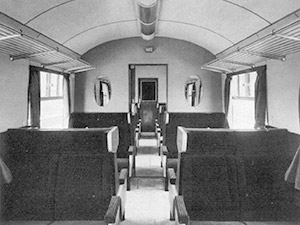Class 123 Swindon 4-car DMUs
Interior Description
The DMBS was formed of two saloons, giving a total of 32 seats. The DMS had 56 seats, formed into seven compartments. The TCK had four first class compartments giving 24 seats, and three second class compartments also giving 24 seats. A set would either have a TS, with 64 seats in two open saloons, or a TBS, with 32 seats in an open saloon and a kitchen and buffet. All had two lavatories, except the buffet which had one small one for staff use only.

Thermostatically controlled warm air, supplied by one underfloor Lucas combustion heater in each car, was circulated through insulated ducts to suitable outlets in the floor. Through control was provided for the guard to switch all heating units on or off, and in warm weather fresh air could be circulated. Saloon lighting was by fluorescent tubes fixed longitudinally down the centre of the ceilings. First class compartments had two BR standard ceiling lights and six individually switched reading lights incorporated into the luggage racks. Second class compartments had four BR standard ceiling lights. In time, the first class compartments received flourescent lights.

All compartments and saloons had curtains, and mirrors were fitted to compartment and saloon bulkheads. Compartment seating was the same as for standard stock, but the saloon seats were a new design incorporating a framework of wood and steel with polyether flexible foam fillings. The contours of these seats were based on ergonomic principles of comfort. Colour schemes used closely followed those being used in standard hauled stock at the time, with BR standard trimming materials, plastics and wood veneers being extensively used.
The two images show the 2nd class accomodation in a compartment (on DMSKL W52097) and open saloon (on DMBSL W52090).
Summary
Description
Interior
Diagrams & Design Codes
Works Photographs
Numbering & Driving Inst.
Liveries
Operations
Non-Passenger Use
Images
No Class 123 vehicles were preserved.


